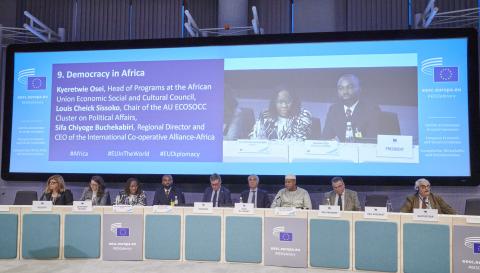At its December plenary session, the European Economic and Social Committee (EEESC) hosted a debate on democracy in Africa with representatives from the African Union Economic and Cultural Council (AU ECOSOCC). Both sides agreed that civil society is the driving force for a successful EU-Africa partnership based on equality, fostering civil and social dialogue.
Following the signature of the Memorandum of Understanding between the EESC and the AU ECOSOCC in July 2024, the plenary debate highlighted the EESC’s commitment to enhancing the strategic partnership with the African Union, supporting the initiative for a joint undertaking to promote the values of democracy, inclusive dialogue and sustainable development.
Kyeretwie Osei, Head of Programs at the African Union of ECOSOCC, in his delivery statement on behalf of the Presiding ECOSOCC Officer Khalid Boudali, explained: «We have an important job in institution building to entrench democratic institutions’ processes around the continent, making sure that we are able to establish good governance including the elimination and reduction of corruption and creation of spaces for citizens’ expression. Civil society is at the heart of this goal».
Oliver Röpke, EESC president stressed: «Cooperation with the AU ECOSOCC is key in promoting the role of civil society in Africa, and make sure it contributes to democracy and human rights. Civil society should take part in decision-making process and tackle further challenges, such as climate change, sustainable development and migration».
According to the Afrobarometer, African citizens are committed to democracy and to the accountability of politicians, and although many believe that their countries are democracies, they are not satisfied with the democracies they have. This explains why problems in Africa that hinder the transition to democracy are often interlinked, such as countries with unstable governments performing poorly when it comes to social and economic development, long-term military presence, disinformation arising from foreign interference, and shrinking space for civil society.
In its opinion Democracy in Africa – current situation and future perspectives. What role for the EESC? adopted in conjunction with this debate, the EESC addresses these challenges and believes that, together with recognised representatives of African civil society platforms and social partners, it can help promote democratic values, advocate for human rights and help to defend democratic regimes in Africa, taking into account the Samoa Agreement.
Carlos Trindade, EESC member and rapporteur for the opinion, mentioned that the European approach to developing democracy in Africa should be based on a relationship between equals, taking into account the continent’s complexity in terms of economic development, social progress, provision of critical infrastructure, diversity and geopolitical and strategic interests.
In her address speech, Sifa Chiyoge Buchekabiri, Regional Director and CEO of the International Cooperative Alliance-Africa (ICA-Africa), spoke about the importance of empowering women in Africa, calling on civil societies to encourage representation of women leadership.
Women make up of 58% of Africa’s self-employed population and contribute around 13% of the continent’s GDP. Yet, despite their significant contribution, they remain disproportionally disadvantaged in accessing economic opportunities and productive resources.
«The importance of civil society organisations in Africa in the promotion of women’s empowerment is key as women are often the backbone of their household, responsible for raising children and managing family resources. Therefore, by empowering women we are not just helping individuals, we are also empowering entire communities» said Ms Chiyoge Buchekabiri.
